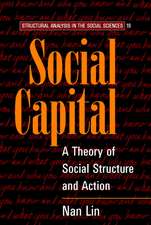Contexts of Social Capital: Social Networks in Markets, Communities and Families: Routledge Advances in Sociology
Editat de Ray-May Hsung, Nan Lin, Ronald L. Breigeren Limba Engleză Paperback – 3 feb 2012
This volume focuses on how social capital interacts with social institutions, based on the premise that markets, communities, and families are the major contexts within which people meet and build up social networks and the foci to create social capital. Featuring innovations in thinking about exchange mechanisms, resource distribution, institutional logics, resource diversity, and the degree of openness or closure of social networks, these chapters present some of the most important advances in this essential field.
Paralleling these theoretical developments, the chapters also improve practical methodological work on social capital research, using new techniques and measurement methods for the uncovering of social logics.
| Toate formatele și edițiile | Preț | Express |
|---|---|---|
| Paperback (1) | 447.48 lei 6-8 săpt. | |
| Taylor & Francis – 3 feb 2012 | 447.48 lei 6-8 săpt. | |
| Hardback (1) | 827.57 lei 6-8 săpt. | |
| Taylor & Francis – 11 dec 2008 | 827.57 lei 6-8 săpt. |
Din seria Routledge Advances in Sociology
-
 Preț: 385.11 lei
Preț: 385.11 lei -
 Preț: 152.39 lei
Preț: 152.39 lei -
 Preț: 309.12 lei
Preț: 309.12 lei - 20%
 Preț: 296.88 lei
Preț: 296.88 lei -
 Preț: 334.09 lei
Preț: 334.09 lei -
 Preț: 204.46 lei
Preț: 204.46 lei - 9%
 Preț: 865.99 lei
Preț: 865.99 lei -
 Preț: 310.81 lei
Preț: 310.81 lei -
 Preț: 326.40 lei
Preț: 326.40 lei -
 Preț: 311.41 lei
Preț: 311.41 lei - 8%
 Preț: 388.98 lei
Preț: 388.98 lei -
 Preț: 288.87 lei
Preț: 288.87 lei -
 Preț: 310.29 lei
Preț: 310.29 lei -
 Preț: 311.41 lei
Preț: 311.41 lei -
 Preț: 303.43 lei
Preț: 303.43 lei -
 Preț: 301.51 lei
Preț: 301.51 lei -
 Preț: 326.63 lei
Preț: 326.63 lei -
 Preț: 152.30 lei
Preț: 152.30 lei -
 Preț: 318.95 lei
Preț: 318.95 lei -
 Preț: 317.48 lei
Preț: 317.48 lei -
 Preț: 312.86 lei
Preț: 312.86 lei -
 Preț: 160.59 lei
Preț: 160.59 lei -
 Preț: 334.09 lei
Preț: 334.09 lei -
 Preț: 309.46 lei
Preț: 309.46 lei -
 Preț: 386.78 lei
Preț: 386.78 lei - 8%
 Preț: 388.92 lei
Preț: 388.92 lei -
 Preț: 310.60 lei
Preț: 310.60 lei -
 Preț: 309.99 lei
Preț: 309.99 lei -
 Preț: 310.51 lei
Preț: 310.51 lei -
 Preț: 283.77 lei
Preț: 283.77 lei -
 Preț: 312.28 lei
Preț: 312.28 lei -
 Preț: 295.10 lei
Preț: 295.10 lei - 8%
 Preț: 383.57 lei
Preț: 383.57 lei - 18%
 Preț: 1111.55 lei
Preț: 1111.55 lei -
 Preț: 445.38 lei
Preț: 445.38 lei - 18%
 Preț: 701.88 lei
Preț: 701.88 lei - 18%
 Preț: 1053.92 lei
Preț: 1053.92 lei - 18%
 Preț: 1002.36 lei
Preț: 1002.36 lei - 18%
 Preț: 1057.89 lei
Preț: 1057.89 lei - 16%
 Preț: 248.31 lei
Preț: 248.31 lei - 18%
 Preț: 1003.30 lei
Preț: 1003.30 lei - 18%
 Preț: 1109.21 lei
Preț: 1109.21 lei - 18%
 Preț: 998.56 lei
Preț: 998.56 lei - 18%
 Preț: 1061.22 lei
Preț: 1061.22 lei - 18%
 Preț: 1058.06 lei
Preț: 1058.06 lei - 18%
 Preț: 1002.36 lei
Preț: 1002.36 lei - 18%
 Preț: 1113.12 lei
Preț: 1113.12 lei
Preț: 447.48 lei
Nou
Puncte Express: 671
Preț estimativ în valută:
85.64€ • 89.08$ • 70.70£
85.64€ • 89.08$ • 70.70£
Carte tipărită la comandă
Livrare economică 15-29 aprilie
Preluare comenzi: 021 569.72.76
Specificații
ISBN-13: 9780415536721
ISBN-10: 0415536723
Pagini: 388
Ilustrații: 72 tables, 1 halftone and 12 line drawings
Dimensiuni: 152 x 229 x 20 mm
Greutate: 0.72 kg
Ediția:1
Editura: Taylor & Francis
Colecția Routledge
Seria Routledge Advances in Sociology
Locul publicării:Oxford, United Kingdom
ISBN-10: 0415536723
Pagini: 388
Ilustrații: 72 tables, 1 halftone and 12 line drawings
Dimensiuni: 152 x 229 x 20 mm
Greutate: 0.72 kg
Ediția:1
Editura: Taylor & Francis
Colecția Routledge
Seria Routledge Advances in Sociology
Locul publicării:Oxford, United Kingdom
Public țintă
PostgraduateCuprins
Part 1: Advances on Theory and Methods of Social Capital 1. Position Generators, Affiliations, and the Institutional Logics of Social Capital: A Study of Taiwan Firms and Individuals Ray-May Hsung and Ronald L. Breiger 2. Changing Places: The Influence of Meeting Places on Recruiting Friends Beate Völker, Henk Flap and Gerald Mollenhors 3. Does the Golden Rule Rule? Rochelle R. Côté, Gabriele Plickert and Barry Wellman 4. Making Democracy Work via the Functioning of Heterogeneous Personal Networks: An Empirical Analysis based on a Japanese Election Study Ken'ichi Ikeda and Tetsuro Kobayashi Part 2: Markets And Social Capital 5. The Context Challenge: Generalizing Social Capital Processes Across Two Different Settings Bonnie H. Erickson 6. The Transaction Cost: Embeddedness Approach to Studying Chinese Outsourcing Jar-Der Luo and Yung-Chu Yeh 7. Constructed Network as Social Capital: The Transformation Of Taiwan’s Small And Medium Enterprise Organization Chieh-Hsuan Chen Part 3: Social Capital in Communities 8. Production And Returns Of Social Capital: Evidence From Urban China Nan Lin, Dan Ao And Lijun Song 9. The Distribution and Return of Social Capital in Taiwan Chih-Jou Jay Chen 10. Social Capital in Communities, Development and Integration: The Four-Village Case Study in Hungary, 2000 Róbert Tardos 11. Distinctiveness and Disadvantage among the Urban Poor: Is Low Network Capital Really the Problem Jeanne S. Hurlbert, John J. Beggs and Valerie A. Haines Part 4: Families and Social Capital 12. Parental Closure Effects on Learning: Coleman’s Theory of Social Capital on Learning Revisited Ly-Yun Chang 13. Childcare Networks and Embedded Experiences Joseph Galaskiewicz, Beth M. Duckles and Olga Mayorova 14. The Immediate Returns on Time Investment in Daily Contacts: Exploring the Network–Overlapping Effects from Contact Diaries Yang-Chih Fu
Notă biografică
Ray-May Hsung is Professor of Sociology at the National Chengchi University, Taiwan.
Nan Lin is Professor of Sociology at Duke University, USA.
Ronald L. Breiger is Professor of Sociology at the University of Arizona, USA.
Nan Lin is Professor of Sociology at Duke University, USA.
Ronald L. Breiger is Professor of Sociology at the University of Arizona, USA.
Descriere
One of the "hottest" concepts in international academic social-science research, social capital refers to the ways in which people make use of social networks in "getting ahead". This book presents the latest contributions and advances in theory and method in this important field.



















